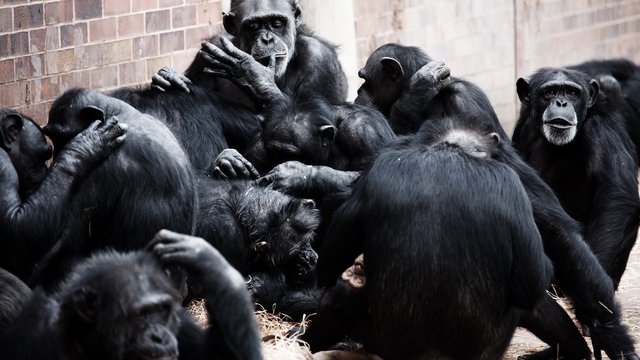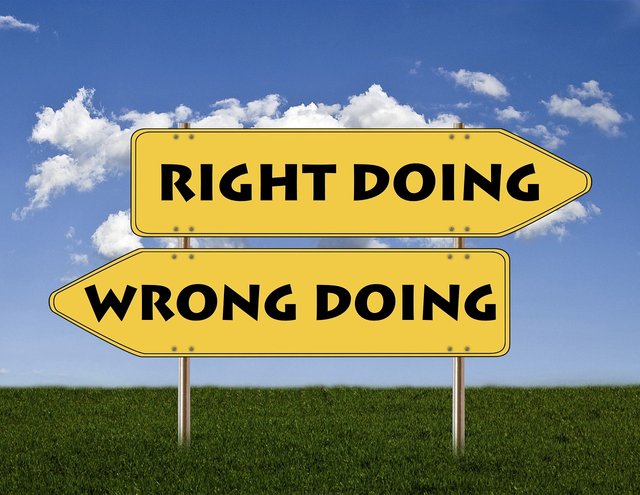Are we merely slaves of our biological determination? Is biological evolution enough to explain the complex structures of human morality? Probably not. Now it is time for some serious business: let’s take a deep dive into the abyss of human behaviour.
This is the third part of a series. I highly recommend starting with part I and II.
Long time, no post. It took me a while to get this one finished, but the result should be (hopefully) satisfying. This part will be quite extensive, because I am going to cover a variety of different topics. So, have a nice cup of coffee or tea, relax and enjoy reading.

Source
"The road to hell is paved with good intentions”
There was once a guy, let’s call him the mysterious Mr. B, who was incredibly popular in many different countries. When he spoke about issues of the time, radio and tv stations, newspapers and blogs all around the globe were keen to comment on his remarks. In some parts of the world, he was considered a saint; people were wearing his face on their shirts. He spent huge amounts of his personal fortune to help widows and orphans; helped to build infrastructure in areas destroyed by war. Although he could have lived a life in luxury, he chose to stay humble his whole life. When he was asked, why he behaved in such an extremely altruistic way, he always referred to his deep religious beliefs. One of his most famous publications (1) stated the following:
“It is the religion of Unification of God, sincerity, the best of manners, righteousness, mercy, honour, purity, and piety. It is the religion of showing kindness to others, establishing justice between them, granting them their rights, and defending the oppressed and the persecuted. It is the religion of enjoining the good and forbidding the evil with the hand, tongue and heart. It is the religion of […] total equality between all people, without regarding their colour, sex, or language.”But who was the mysterious Mr. B? He really sounds like a decent guy, maybe Nelson Mandela, the Dalai Lama or the pope?
Well, you could not be more wrong. This famous philanthrope was in charge of one of the biggest terrorist networks in human history: his name was Osama bin Laden.
Why am I telling you this?
Because you need to understand something very important: evolution provided you with some invaluable tools for being kind, empathic and ethical towards your fellow human beings.
But human morality is a double-edged sword. After this article you will understand the why.
It took me quite a while to figure out, how I am going to approach this third part of the series.
After I told you already so much about evolution and neuroscience, it did not seem to fit, to make another part about biological aspects. But this is actually harder, than you might imagine.
Sure, I could have written a lot about philosophical theories or social constructivism (very interesting) – but this did not seem to fit the way this series is written, because I chose an almost entirely empirical approach.
Therefore, I had a problem. But once again, I got lucky. During my research for this article, I came across the book Moral Development and Reality – Beyond the Theories of Kohlberg, Hoffman, and Haidt by John C. Gibbs (2), professor for Developmental Psychology at the Ohio State University. Kohlberg is probably the most familiar name for you, but all of the mentioned people provided a lot of work regarding the development of human morality.
So, I am going to give you a short overview about the work of each one of them and will discuss further implications afterwards.
Welcome to the stage
After Piaget laid the foundations, Lawrence Kohlberg started to work at a stage model of moral developments. For more details, you can take a look the article, which he wrote in 1975 (3). According to his model, there are six different stages of moral development, divided into three levels:
- I. Preconventional level
Cultural labels of good and bad are either interpreted in hedonistic consequences (punishment, reward, exchange of favors) or physical power of the ones who provide the labels.
Stage 1: Punishment-and-obedience orientation – whether an action is good or bad is determined by its physical consequences. This stage is mainly about avoiding punishment.
Stage 2: The instrumental-relativist orientation – “Right actions” are defined as those, which satisfy one’s own need or the needs of others in terms of a marketplace. Remember TIT FOR TAT? That’s all about it.
- II. Conventional level
Living up to the expectation of one’s own family/nation/group is good for its own sake. Loyalty, conformity and maintenance towards the social group and order are demanded.
*Stage 3: The interpersonal concordance or "good boy – nice girl" orientation – The good pleases/helps others and achieves their approval. Being “nice” earns social value.
*Stage 4: The “law and order” orientation – Maintaining social order, obeying authorities and doing one’s own duty is considered as “right behaviour”.
- III. Postconventional, autonomous or principled level
At the last level you will be able to define moral values and principles independent from authorities or associated groups.
*Stage 5: The social-contract, legalistic orientation – Generalization is key. Right actions are considered those, which pay respect to individual rights and standards on which the whole society has agreed on. It is evident, there is a relativism of personal values and clear rules are needed to achieve a consensus. Laws can be changed in rational considerations of social utility (unlike Stage 4).
*Stage 6: The universal-ethical-principle orientation – Right behaviour is now defined by the decision of conscience, based on self-chosen ethical principles regarding logical comprehensiveness, universality and consistency. They are meta-principles (the Golden Rule, the categorical imperative) and not a specific set of rules (Ten Commandments). The last stage is based upon the four principles of justice, reciprocity, equality of human rights and the respect for the dignity of human beings as individuals.
Until today, there is an extensive amount of research available, which supports the applicability and sequentiality of Kohlberg’s stages. Especially the ones associated with the transition to adolescence, were empirically tested by Gibbs et al. (2007) (4). Their conclusion was, although Kohlberg’s work had its shortcomings, his reasoning regarding the universality of basic moral judgment development, moral values and related social perspective-taking is consistent across cultures.
This does not prove, however, that Kohlberg’s theory provides a correct and comprehensive image of moral development (Moshman, 2011) (5). His theory does not take into great account the impacts of emotions and empathy in moral development, as well as it underestimates the impact of contextual factors on behaviour (e.g. van der Velden et al., 2010) (6).

Source
The primacy of affect
With his book Empathy and Moral Development – Implications for Caring and Justice (7) Martin Hoffman presented an impressive work regarding the different factors, which impact human morality. Although his theory includes biological aspects as well, I am going to skip the details, because after my first two articles you should already be quite familiar with them.
Empathy. Again.
Hoffman distinguishes between two different modes of empathy:
- Basic: conditioning, involuntary mechanisms of mimicry and direct association
- Mature: mediated association, perspective-taking
The basic modes are, as I have shown you, shared across mammalian species. But as you can imagine, it needs the capabilities of the human brain to make full usage of empathic behaviour of a higher cognitive order. To put it simply:
Either you are only able to feel basic empathic concern, or you can understand those feelings as well. As humans, in most cases we are able to do both.
Be mature
After you were born, you were only able to express basic empathic feelings. But as you grew older and with the beginning of your cognitive and language development in the second year, you started to gain some fancy new tools: verbally mediated association and social perspective / role taking.
- Verbally mediated association
Language is one of the most useful inventions humanity has ever made. It is not only because of the knowledge it can transport even across oceans, but the triggering of empathic feelings as well. Imagine, you are reading a letter from a dear friend, describing his desperate situation of losing his job and his frustration with life in general. Although you may be miles away, you can understand and, to some extent, experience his feelings.
- Social perspective-taking
The ability, to take the role or contextual perspective of another individuum. De Waal (2009) pointed out, other species are able to do so as well (apes, dolphins, elephants, dogs), but their ability is limited to the here and now. But humans are able to imagine themselves in another situation, they can visualize how their actions benefit (or hurt) another being.
This can either happen in a self-focused (how would you feel in the other’s situation) or an other-focused (how would the other or people in general feel in this situation) way.
To achieve, what Hoffman calls a “fully mature” perspective taking, it is necessary to be able to think about both self and other people regarding one’s own actions.
The psychologists among us will notice, that there is more to is. As well as Kohlberg did it, Hoffman created a six-stage-model of empathy. Although it is an interesting read, I am not going to present you a more detailed explanation here. The reason is quite simple: The things I have already explained, are, in my humble opinion, enough for a general understanding of his ideas. If you are interested to know more, feel free to use my references.
Limits of empathy
Although Hoffman argues, that empathy is probably the foundation of prosocial morality, it has its limitations. Especially the intervention of a reasoning thought process can lead to a quite different outcome than prosocial behaviour.
The reaction of an individual depends how said person interprets the straits of another person. In the end, they may either be empathic, neutral or counterempathic (Pinker, 2011, p. 57; cf. Hoffman, 2009) (8).
Even mature empathy does not ensure a prosocial behaviour. Hoffman himself was quite aware of this, as he pointed out, that self-concerns, causal attributions and other cognitive interpretations can affect the empathic emotion and change social behaviour.
Most noticeably is this in cases of victim-blaming. If the observer thinks, the victim is responsible for its own suffering, it will not result in a supporting, prosocial action towards the victim. Or if the victim is attributed in a negative way, regardless of his sufferings, there will be not much empathy left.
The importance of empathy should probably not be forced upon the unwilling. There is a risk that so-called “empathic over-arousal” can occur. This means, that intense and massive signs of distress (world hunger, war, poverty, etc.) can create personal distress in the observer. This was quite prominently shown by Seider (2009) (9). He conducted an empirical research on the impact of intervention programs designed to promote empathy and prosocial behaviour. The high school program “Literature and Justice” on world hunger and poverty reduced the students support for humanitarian aid. It appears, they were overwhelmed by the presented statistics, felt personal discomfort and experienced apathy rather than empathy, because they were not able to do much about it anyway.
The second limitation is the “empathic bias”. It is about the difficulty of identifying with people of other social groups. This is an interesting aspect and probably responsible for a lot of the suffering we have seen in history and today’s reality. I will lay a more detailed focus this matter later on.

Source
Moral socialization
In Hoffman’s theory, moral development is based upon empathy, but established during our socialization process. Under optimal circumstances, we get to a point, where the moral socialization transforms to and moral internalization. This means, that a moral norm has been adopted as one’s own moral reasoning. Or as Hoffman (2000, p. 135) put it, the child:
experiences the normative information as deriving autonomously from within oneself
Therefore it has some kind of inner duty to live up to his own moral standards as experiences guilt, if it fails to do so.
Socialization as a process itself happens in the early stages of our life mostly through our parents or other near relatives. Later on, social instituions and peer-groups are providing additional influence. The stronger our connection towards the respective people or institutions is, the more likely the adoption of their moral standards will happen.
Conclusion
Hoffman’s theory provided us with a better understanding of the fact, that morality cannot be addressed without considering the egoistic motives of the individual, its interpretations and thoughts about the observed person. We are now aware, that morality contains more than a simple “right” or “wrong” attitude, but is influenced by multiple factors, which can change over time.

Source
Good, bad, whatever? – Validity of Moral Pluralism
Back in 2012 Jonathan Haidt et al. (10) proposed a new idea about the variation in human moral reasoning: Moral Foundations Theory: The Pragmatic Validity of Moral Pluralism.
The theory itself can be summarized in four claims:
- Nativism – there is a first draft of the moral mind
According to Haidt and colleagues, evolution provided us a first idea (or draft) of moral behaviour. This is not written in stone but can be altered to meet different circumstances. It is, therefore, important to distinguish between this first draft and the process of editing it.
Any experience we endure, shapes our mind in a slightly different way. Social values and norms are learned (or not) as a response to those experiences.
- Cultural learning – the first draft gets edited during development within a particular culture
With birth we acquired a set of “learning instincts”, which are used for learning a specific way of life shortly after we were born. Whether we were raised in a religious, partly hierarchic country like India or in a liberal society like America, reflects greatly our behaviour in general. It is not impossible to change this kind of behaviour to some extent, but it will leave its mark nevertheless.
- Intuitionism – Intuitions come first, strategic reasoning second
The moral judgment regarding a certain situation tends to happen quickly. This is mainly based on Haidt’s (2001) (11) Social Intuitionist Model, which defined this as asudden appearance in consciousness, or at the fringe of consciousness, of an evaluative feeling (like–dislike, good–bad) about the character or actions of a person, without any conscious awareness of having gone through steps of search, weighing evidence, or inferring a conclusion.
Therefore, moral evaluation is not so much about careful reasoning, but more a rapidly and automatically occurring thought.
This does not mean, individuals are not able to use reason for moral decisions, but they are merely re-shaping their first, intuitive impression of it.
- Pluralism – There were many recurrent social challenges, so there are many moral foundations
At last, Haidt and his colleagues present five moral foundations, which are, according to their theory, mainly responsible for moral development.
Care/harm foundation:
Every system which increases the chance of an automatic response towards suffering with the motivation to care, nurture or protect.
Fairness/cheating foundation
Minds, which are capable of higher reasoning and advanced experiences are sensitive regarding either cheating or cooperation. Tit for tat is considered as fair behaviour.
Loyalty/betrayal foundation
The creation of complex social structures, including hierarchies and power distribution and the reward/punishment for the in- or out-group individuals.
Authority/subversion foundation
The obedience towards a higher-ranking authority. Can be seen either as a virtue, neutral or a mistake in human society – depending on the specific subculture one belongs to.
Sanctity/degradation foundation
Emotion of disgust or pleasure towards specific kinds of food or actions.
Conclusion
Apparently, this is a quite relativistic approach. Whether a specific action is seen as morally “right” or “wrong” depends mainly from which perspective you are looking at it. This can lead to such extreme views as female genital mutilation is a mere alteration in the end. Gibbs points towards Haidt at this point, but I was not able to find anything related to it, so I would tread with care.
After all, it seems not unlikely that moral norms differ across societies. This does not mean, however, the relativistic approach is justified. Some basic principles are shared across cultures. People around the globe appreciate the values of life, affiliation, contract, truth, property and law (Gibbs et al. 2007).
Personally, I am quite content with the way, Hoffman put it:
“Since the holocaust cultural relativism is dead. We no longer have the luxury of assuming every culture’s values or guiding principles will pass the moral test and that each is as [morally] good as any other.”

Source
Broken mirrors and two-faced Gods
You now have a basic understanding of some of the most important theories of moral development in psychology. After all the theoretical stuff, I am going to show you now some real world examples.
The philosophical minds among my readers have probably noticed the reference of my chosen title for this part of the series.
“Hell is other people” – one of the most famous quotes by Jean-Paul Sartre from his play No Exit (12). The idea behind those words is well known among psychologists. Remember the “empathic bias”? This concept is also called the in-group-out-group bias (13).
This dualism is almost as old as time itself.
And thou shalt consume all the people which the LORD thy God shall deliver thee; thine eye shall have no pity upon them: neither shalt thou serve their gods; for that will be a snare unto thee.
-Deuteronomy 7:16(14)
For many people, religion is still an important part of their lives and the belief, that being religious is important for being a moral person is hold strongly among many people. In fact, the negative prejudices towards atheists for committing immoral acts, is extremely high. In 2017, Gervais et al (15). were able to show how strong the connection between religion and moral behaviour really is. It does not even matter at all, whether you ask people of a religiously diverse societies or the ones with a (non)-religious majority – intuitive, negative anti-atheist prejudices were found all across the board.
To give you a better understanding to which awkward thoughts this can lead, think about the following:
The participants of the study were asked, what they are thinking about a priest, who molests young boys for decades. Amazingly, the majority thought, that this priest does not believe in God at all – because that which must not, cannot be.
For me, it comes of no great surprise, that moral behaviour is still thought of as religious thing – considering the human desire to look for easy answers.
But back to topic. The part of the bible, which I quoted above, is a really nice example for the in-group-out-group bias. You are all probably aware of the 5th commandment (16):
Thou shall not murder.
There are two important things to notice:
- It speaks of “murder” and not “kill” – murder is, in this case, considered a crime among members of one society; so, you cannot commit murder, if you kill an individual of another tribe.
- This is, why the commandment is not a contradiction to the mentioned Deuteronomy 7:16. The people of other societies do not belong to your own and therefore it is perfectly justified to kill them, to fulfil God’s mission. The bible is, in its own, weird way, quite logical.
The distinction between us and them is an image, which is used not only in religion, but in politics and entertainment as well. In modern pop-culture it is usual to build some kind of archvillain, against whom the protagonist (the hero) has to fight to ensure the success of good over evil. Think about Sauron in Lord of the Rings, Lord Voldemort in Harry Potter or the Emperor in Star Wars – all impersonations of the so-called evil itself. Their actions are considered as highly immoral. They lie, cheat, threaten, torture and kill to fulfil their goals. And all of them are using armies of underlings, which they convince (if not enslave) of a higher cause worthy the fight – men, mudbloods, rebels – enemies, the others, the out-group. This works in fiction as well as in real life. Sadly.
Remember I said politics? How do you think, the holocaust was possible?
Centuries of antisemitic lies and conspiracy theories, which marked the Jews as some kind of mysterious, unknown and dangerous force. From this, it was only a small step towards the dehumanization and elimination of the out-group.
”It is not enough to isolate the Jewish enemy of mankind-the Jew has got to be exterminated.”
-Robert Ley (17)
“The German people has recognized that the Jew has crept in like a parasite not only into our people, but into all the peoples of the earth, and that it is attempting to corrupt the original racial characteristics of the peoples in order to destroy them both racially and as states, and thereby rule over them.”
-The Jew as World Parasite (18)
No empathy, no pity, no sympathy at all.
This bias is not just some fancy psychological theory, but results in real, sometimes deadly, consequences for humans. It is important to be aware of this concept, because only then you will be able to deal with its implications.
People can be cruel beyond imagination, no matter their evolutionary empathic foundations. The experiences one gains over the course of his lifetime can easily overrule the biological tendencies of being a nice guy in theory.

Source
Don’t hope, act.
So, what is human morality after all?
As I promised: There is no easy way out. With this series of articles, I have merely scratched the surface. So, no satisfying answer in the end?
Well, not so fast.
I was, hopefully, able to provide you with some convincing evidence, that we all share at least the same foundation for moral behaviour. And, as stated above, there are indeed some virtues people across cultural differences can appreciate.
Life, health, property, truth – just to name a few again – are important for most of the people alive. In which way these virtues are perceived in the end, depends, of course, mainly on their socialization and their relationship towards individuals of other groups.
It seems safe to assume, that it is indeed not impossible to achieve some kind of universal morality, to extend our empathy beyond our own group, in realizing we all share the same basic foundations. I am far away from saying it is easy, quite the opposite. There are many obstacles at this path, some of which I have already presented to you. But every action which supports the strengthening of the stated virtues for your fellow human beings is an action, which can be seen as morally good.
It is easy to destroy, to create more chaos and entropy, but way tougher to create and build.
Life is about choices. Act or be lethargic, use your time for self-development or waste it. Doing something useful, something meaningful is almost always connected to hard work but in the end, it will pay off. The human mind admires the fun and easy way out, but if we want to change something, we cannot rely on that.
I am confident, we, as individuals, can contribute our own part towards a more peaceful and moral society.
Choose the hard way.
Feel always free to discuss my ideas and share your own thoughts about the things I’m writing about. Nobody is omniscient and if we all walk away a bit smarter than before, we’ll have achieved a lot.
Thanks for reading.
Ego

Make sure, to check out #steemstem for more science related content.
References
(1) http://www.theguardian.com/world/2002/nov/24/theobserver
(2) Gibbs, John C. Moral development and reality: beyond the theories of Kohlberg, Hoffman, and Haidt. 2014. Oxford University Press
(3) Kohlberg, Lawrence. The Cognitive-Developmental Approach to Moral Education. The Phi Delta Kappan. Vol. 56. No. 10. A Special Issue on Moral Education. 1975. pp. 670-677
(4) Gibbs, John C., Basinger, Karen S., Grime, Rebecca L., Snarey, John R. Moral judgment development across cultures: Revisiting Kohlberg’s universality claims. Developmental Review 27. 2007.
(5) Moshman, David. Adolescent rationality and development: cognition, morality, and identity. 2011. Psychology Press. Taylor & Francis Group
(6) Van der Velden, Floor, Brugman, Daniel, Boom, Jan, Koops, Willem. Moral cognitive processes explaining antisocial behavior in young adolescents. International Journal of Behavioral Development. 2010. 34: 292.
(7) Hoffman, Martin L. Empathy and Moral Development: Implications for Caring and Justice. 2000. Cambridge University Press
(8) Pinker, Steven. The Better Angels of Our Nature: Why Violence Has Declined. 2011. Penguin Books
(9) Seider, Scott. Overwhelmed and Immobilized: Raising the Consciousness of Privileged Young Adults about World Hunger and Poverty. International Studies Perspectives .2009. 10, 60–76.
(10) Graham, Jesse, Haidt, Jonathan, Koleva, Sena, Motyl, Matt, Iyer, Ravi, Wojcik, Sean P. Ditto, Peter H. Moral Foundations Theory: The Pragmatic Validity of Moral Pluralism. Advances in Experimental Social Psychology, Forthcoming. 2012
(11) Haidt, Jonathan. The Emotional Dog and Its Rational Tail: A Social Intuitionist Approach to Moral Judgment. Psychological Review. 2001. Vol. 108. No. 4, 814-834
(12) http://vtheatre.net/script/doc/sartre.html
(13) https://en.wikipedia.org/wiki/In-group_favoritism
(14) https://www.biblegateway.com/passage/?search=Deuteronomy+7%3A16&version=KJV
(15) Will M. Gervais *, Dimitris Xygalatas, Ryan T. McKay, Michiel van Elk, Emma E. Buchtel, Mark Aveyard, Sarah R. Schiavone, Ilan Dar-Nimrod, Annika M. Svedholm-Häkkinen, Tapani Riekki, Eva Kundtová Klocová, Jonathan E. Ramsay and Joseph Bulbulia
(16) https://www.biblegateway.com/passage/?search=Deuteronomy%205:4%E2%80%9321:4&version=!
(17) https://www.phdn.org/archives/www.ess.uwe.ac.uk/genocide/statements.htm
(18) http://research.calvin.edu/german-propaganda-archive/weltparasit.htm
Interesting .. I do not agree with your conclusion
Ethics challenges the selfishness of the person, although it is in his interest and values do not change, But we are taking this morality by mind not instinctively as animals ..You have the freedom to be bad or good
And God will not oppress you, and He will judge you through your work.
Thanks for sharing
Downvoting a post can decrease pending rewards and make it less visible. Common reasons:
Submit
Wow, this is really worth the time and effort you put into it. Thanks for sharing such knowledge
Downvoting a post can decrease pending rewards and make it less visible. Common reasons:
Submit
Yeah, it took me about 15 hours to finish it, so I'm glad you liked it :)
Downvoting a post can decrease pending rewards and make it less visible. Common reasons:
Submit
An interesting and well sourced article. Moral relativism can not provide much of a framework since it is a moving target. But then so are these "people."
Downvoting a post can decrease pending rewards and make it less visible. Common reasons:
Submit
I agree on that. But I do think, it is important to acknowledge the difference between the approach to moral questions. Only then it's possible to find some sort of consent.
Downvoting a post can decrease pending rewards and make it less visible. Common reasons:
Submit
Wow. Really a long one but it's worth reading. Thanks for this awesome writing. As humans we much be intentional about having a peaceful and morally sound society. Though it may be difficult but it's never impossible.
Keep up the good works sir, I'll continue to follow your posts.
Downvoting a post can decrease pending rewards and make it less visible. Common reasons:
Submit
Thanks a lot :)
My future posts will probably not be this extensive, but I'm always going to provide valid research :)
Downvoting a post can decrease pending rewards and make it less visible. Common reasons:
Submit
Damn, what an amazing read! If only every bit of content on Steemit was so good and well researched... Resteemed!
Downvoting a post can decrease pending rewards and make it less visible. Common reasons:
Submit
Thank you very much! Glad, you liked it :)
Downvoting a post can decrease pending rewards and make it less visible. Common reasons:
Submit
This is a good post.. thanks for sharing. Resteemit done
Downvoting a post can decrease pending rewards and make it less visible. Common reasons:
Submit
Thank you :)
Downvoting a post can decrease pending rewards and make it less visible. Common reasons:
Submit
Great work here.
Downvoting a post can decrease pending rewards and make it less visible. Common reasons:
Submit
Thank you very much :)
Downvoting a post can decrease pending rewards and make it less visible. Common reasons:
Submit
Really great post.
Downvoting a post can decrease pending rewards and make it less visible. Common reasons:
Submit
Thank you :)
Downvoting a post can decrease pending rewards and make it less visible. Common reasons:
Submit
its very long writing,but i am inspire my life.
Keep up the good works sir, I'll continue to follow your posts.
Downvoting a post can decrease pending rewards and make it less visible. Common reasons:
Submit
Thanks! :)
Downvoting a post can decrease pending rewards and make it less visible. Common reasons:
Submit
You got a 2.90% upvote from @postpromoter courtesy of @egotheist!
Want to promote your posts too? Check out the Steem Bot Tracker website for more info. If you would like to support the development of @postpromoter and the bot tracker please vote for @yabapmatt for witness!
Downvoting a post can decrease pending rewards and make it less visible. Common reasons:
Submit
Congratulations, you were selected for a random upvote! Follow @resteemy and upvote this post to increase your chance of being upvoted again!
Read more about @resteemy here.
Downvoting a post can decrease pending rewards and make it less visible. Common reasons:
Submit
Creo que la visión del determinismo esta bastante superado en la literatura de la filosofía moderna, creo que el post esta bastante como literatura.
Downvoting a post can decrease pending rewards and make it less visible. Common reasons:
Submit
If you write in English, I will be able to provide a better answer :)
Downvoting a post can decrease pending rewards and make it less visible. Common reasons:
Submit
This post has received gratitude of 5.40 % from @appreciator thanks to: @egotheist.
Downvoting a post can decrease pending rewards and make it less visible. Common reasons:
Submit
You got a 3.77% upvote from @buildawhale courtesy of @egotheist!
If you believe this post is spam or abuse, please report it to our Discord #abuse channel.
If you want to support our Curation Digest or our Spam & Abuse prevention efforts, please vote @themarkymark as witness.
Downvoting a post can decrease pending rewards and make it less visible. Common reasons:
Submit
very intresting post nice work :)
Downvoting a post can decrease pending rewards and make it less visible. Common reasons:
Submit